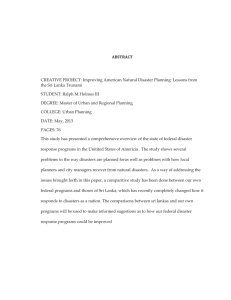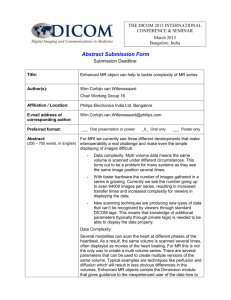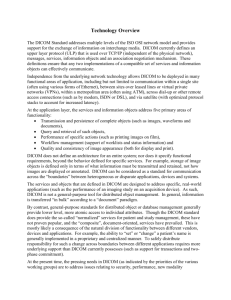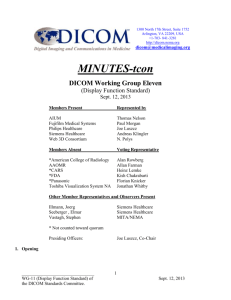ITU Workshop on Emergency Telecommunications for Disaster Management in Sri Lanka 23
advertisement
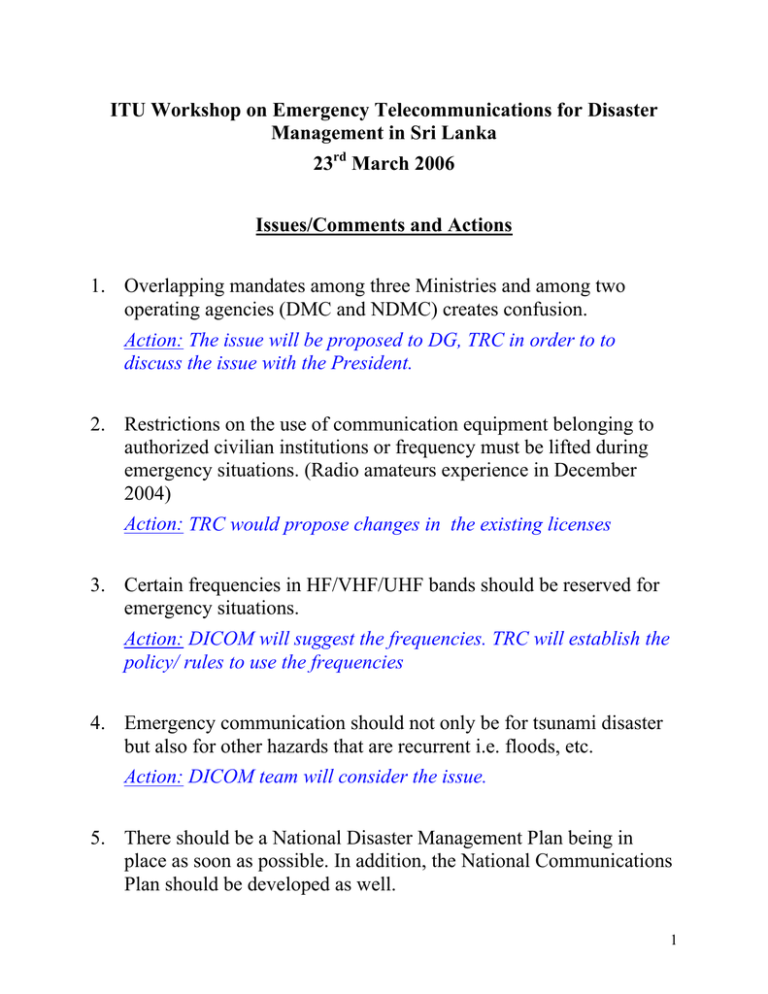
ITU Workshop on Emergency Telecommunications for Disaster Management in Sri Lanka 23rd March 2006 Issues/Comments and Actions 1. Overlapping mandates among three Ministries and among two operating agencies (DMC and NDMC) creates confusion. Action: The issue will be proposed to DG, TRC in order to to discuss the issue with the President. 2. Restrictions on the use of communication equipment belonging to authorized civilian institutions or frequency must be lifted during emergency situations. (Radio amateurs experience in December 2004) Action: TRC would propose changes in the existing licenses 3. Certain frequencies in HF/VHF/UHF bands should be reserved for emergency situations. Action: DICOM will suggest the frequencies. TRC will establish the policy/ rules to use the frequencies 4. Emergency communication should not only be for tsunami disaster but also for other hazards that are recurrent i.e. floods, etc. Action: DICOM team will consider the issue. 5. There should be a National Disaster Management Plan being in place as soon as possible. In addition, the National Communications Plan should be developed as well. 1 Action: The ongoing development of Disaster Management Plan by the DMC needs to involve the DICOM team to focus on communication issues. TRC should start developing the National Communications Plan as soon as possible with support from DICOM team. 6. National roaming in the state of disaster is a valid concept however it is business-sensitive issue for telecom operators, then TRC should explore the possibility Action: TRC will do the study as proposed in ITU Report: Recommendation 6.7.4 (Priority and National Roaming) and Appendix 5 and 7. 7. Call Priority is also a valid concept; however the issue is who should be given priority. Specific telephone numbers and organizations should be identified. Action: DMC should identify priority list and TRC will do the study as proposed in ITU Report: Recommendation 6.7.4 (Priority and National Roaming) and appendix 6 and 7 8. Police must be equipped with effective communication facilities and training because they have 401 police stations. Action: As proposed in ITU Report: Recommendation 6.6 (Police to investigate more efficient of their radio channels), and Recommendation 6.2 (Identify and educate ICT technicians and Radio operators), necessary actions will be taken. 9. The establishment of radio volunteer organization with certain allocated frequency must be explored. 2 Action: The DICOM will act as proposed in ITU Report: Recommendation 6.2 (Identify and educate ICT technicians and Radio operators) and action identified in the Item 3. 10. There is enough telecom facilities in place in Sri Lanka and the agencies involved in early warning system can access or avail these systems in their operation. Action: It is not lacking of communication resources but coordination and cooperation among the agencies. The formed DICOM team will take necessary actions. 11. Standardization of messages e.g. Common Alerting Protocol (CAP) should be adopted so communities can understand Action: The DICOM team will act as proposed in ITU Report: Recommendation 6.8.4 (Multi-hazard early warning system), Appendix-3 (Emergency Alert via Broadcasting), and Appendix-4 (RTU and Sensor Communication via SMS or Data channels GSM networks) 12. The use of existing communication system at the district or community level should be optimized Action: As identified in the Item 10. 13. There should be a database of each agency’s existing communication networks e.g. network topology so that those networks can be shared in the state of Emergency Action: DICOM team will exchange the existing communication networks information available in the country and identify the shared possibility in case of emergency. TRC will take actions to secure the information for restricted users. 3 14. TRC should take the lead and responsibility to formulate the emergency telecom plan Action: As identified in the Item 5 15. Management is a major issue for Disaster Management Action: As identified in the Item 1 16. Not all participating organizations are aware of the existence of the Roadmap. Action: As identified in the Item 5 17. Communicating the Road map with other agencies Action: As identified in the Item 5 18. DMC should be equipped with all necessary resources as soon as possible. Other agencies have shown willingness to provide technical supports to DMC. Action: As identified in the Item 1 and DICOM team will provide supports. 19. CEB communications network is not mentioned in the ITU report while its resources should be utilized during an emergency case Action: CEB is part of DICOM team and the team will identify the use of CEB network in case of emergency 20. There should be only one common emergency number. Currently 119 used for all emergency cases and it connected to 401 police stations as well as to VHF radio. The number 118 is for receiving complaints 4 Action: DICOM team will ensure that 119 will be used in all emergency cases. 21. For the purpose of relief and rescue operations, it should be DMC’s responsibility to brief international organizations on existing communication networks/plan and current situation in the country. Action: DICOM team will assist DMC to establish the function. 22. Communication drills need to be conducted regularly Action: DICOM team will implement the Recommendation 6.5 Appendix 3, 7, 8 and 9 in the ITU Report 23. Media plays a very important role in disseminating warning messages. DMC should be responsible for providing information to media and other institutions concerned. Action: As identified in the Item 5 5 DICOM Team: As proposed in the ITU recommendation 6.1 an interim DICOM Team has been formed consisting of the following members: 1. Telecommunication Regulation Commission – Mr. Kanchana Ratwatte, Director General 2. Telecommunication Regulation Commission – to be nominated by the DG 3. Ministry of Defence Public Security, Law and Order – Mr. Janaka Mudalige, Director Information Technology 4. Sri Lanka Army – Colonel KRP Rowel 5. Telecom Operators – Mr. Batholameuz and Mr. Michael de Silva 6. Radio Society of Sri Lanka, RSSL – Mr. Victor Goonatilleke, Former Chairman 7. Ceylon Electricity Board – Mr. Mahinda Wijesanma 8. Department of Meteorology – Mr. Nuwan Kumarasighe, Engineer 9. Disaster Management Center – Mr. Dhamnika Wijesoonya 10. Irrigation Department – Ms. P.P.G. Dias, Deputy Director / Hydrology Division 11. Sri Lanka Police – SSP R.S.P. Siriwardana, Director Communications 12. Sarvodaya – Dr. Vinya Ariyaratne 13. Sri Lanka Air Force – Mr. Rohan Pathirage, Group Captain 14. Reconstruction and Development Agency (RADA) – Ms. Rachel C. Perera, Director, donor/NGO/Civil Society Coordination 15. Sri Lanka Navy – Commander TWW. Leelarathna, The Command Electronics Officer (West) 6
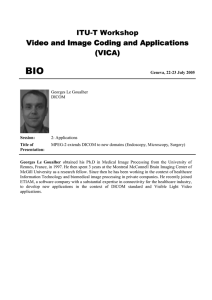
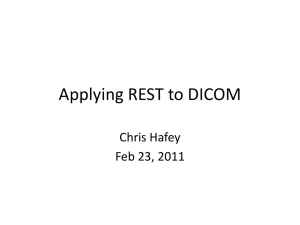

![[#MIRTH-1930] Multiple DICOM messages sent from Mirth (eg 130](http://s3.studylib.net/store/data/007437345_1-6d312f9a12b0aaaddd697de2adda4531-300x300.png)
